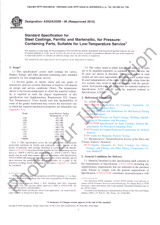Wir benötigen Ihre Einwilligung zur Verwendung der einzelnen Daten, damit Sie unter anderem Informationen zu Ihren Interessen einsehen können. Klicken Sie auf "OK", um Ihre Zustimmung zu erteilen.
ASTM D7688-18
Standard Test Method for Evaluating Lubricity of Diesel Fuels by the High-Frequency Reciprocating Rig (HFRR) by Visual Observation
Name übersetzen
NORM herausgegeben am 1.8.2018
Informationen über die Norm:
Bezeichnung normen: ASTM D7688-18
Anmerkung: UNGÜLTIG
Ausgabedatum normen: 1.8.2018
SKU: NS-897555
Zahl der Seiten: 9
Gewicht ca.: 27 g (0.06 Pfund)
Land: Amerikanische technische Norm
Kategorie: Technische Normen ASTM
Kategorie - ähnliche Normen:
Die Annotation des Normtextes ASTM D7688-18 :
Keywords:
boundary lubrication, diesel fuel, friction, HFRR, lubricity, wear,, ICS Number Code 75.160.20 (Liquid fuels)
Ergänzende Informationen
| Significance and Use | ||||||||||||||||
|
5.1 Diesel fuel injection equipment has some reliance on lubricating properties of the diesel fuel. Shortened life of engine components, such as diesel fuel injection pumps and injectors, has sometimes been ascribed to lack of lubricity in a diesel fuel. 5.2 The trend of HFRR test results to diesel injection system pump component distress due to wear has been demonstrated in pump rig tests for some fuel/hardware combinations where boundary lubrication is believed to be a factor in the operation of the component.5 5.3 The wear scar generated in the HFRR test is sensitive to contamination of the fluids and test materials, the temperature of the test fuel, and the ambient relative humidity. Lubricity evaluations are also sensitive to trace contaminants acquired during test fuel sampling and storage. 5.4 The HFRR and Scuffing Load Ball on Cylinder Lubricity Evaluator (SLBOCLE, Test Method D6078) are two methods for evaluating diesel fuel lubricity. No absolute correlation has been developed between the two test methods. 5.5 The HFRR may be used to evaluate the relative effectiveness of diesel fuels for preventing wear under the prescribed test conditions. Correlation of HFRR test results with field performance of diesel fuel injection systems has not yet been determined. 5.6 This test method is designed to evaluate boundary lubrication properties. While viscosity effects on lubricity in this test method are not totally eliminated, they are minimized. |
||||||||||||||||
| 1. Scope | ||||||||||||||||
|
1.1 This test method covers the evaluation of the lubricity of diesel fuels using a high-frequency reciprocating rig (HFRR). 1.2 This test method is applicable to middle distillate fuels, such as Grades No. 1-D S15, S500, and S5000, and Grades No. 2-D S15, S500, and S5000 diesel fuels, in accordance with Specification D975; and other similar petroleum-based fuels which can be used in diesel engines. This test method also is applicable to biodiesel blends. B5 was included in the round robin program that determined the precision statement. Note 1: It is not known that this test method will predict the
performance of all additive/fuel combinations. Additional work is
underway to establish this correlation and future revisions of this
test method may be necessary once this work is complete.
1.3 The values stated in SI units are to be regarded as standard. No other units of measurement are included in this standard. 1.4 This standard does not purport to address all of the safety concerns, if any, associated with its use. It is the responsibility of the user of this standard to establish appropriate safety, health, and environmental practices and determine the applicability of regulatory limitations prior to use. 1.5 This international standard was developed in accordance with internationally recognized principles on standardization established in the Decision on Principles for the Development of International Standards, Guides and Recommendations issued by the World Trade Organization Technical Barriers to Trade (TBT) Committee. |
||||||||||||||||
| 2. Referenced Documents | ||||||||||||||||
|
Empfehlungen:
Aktualisierung der technischen Normen
Wollen Sie sich sicher sein, dass Sie nur die gültigen technischen Normen verwenden?
Wir bieten Ihnen eine Lösung, die Ihnen eine Monatsübersicht über die Aktualität der von Ihnen angewandten Normen sicher stellt.
Brauchen Sie mehr Informationen? Sehen Sie sich diese Seite an.




 Cookies
Cookies
